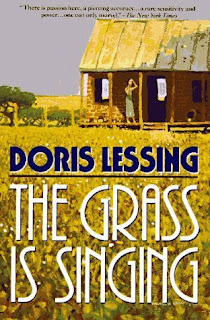1950
Reviewed by Marianne
from Let's Read
Doris Lessing's first novel. It received a lot of praise and she was an author of whom much was excepted. She fulfilled it all, her Nobel Prize is a great testimony.
The story takes place in Zimbabwe when it was still called Rhodesia. I guess it could have been any other colony where the white rulers made the black natives their subservients. As we all know, that didn't last forever, it couldn't last forever.
We can see the trouble by looking at some settlers and their problems. Not only did they not know the land and its very own specifics, they were not meant for a climate and a country like this. It had to lead to disaster, one way or another.
Doris Lessing describes the problems very well by looking at Mary, married to a poor farmer, unhappy with her life, not knowing how to improve it. You can tell that she lived in the country herself.
Comments by other members from our book club:
• We had a really good discussion about this book and it was scored 4/5 or 5/5 by all.
• The writing was excellent in making one see and feel the location and climate. We discussed many topics: the main characters, their psychology and motivations, the time and history and societal pressure for marriage and being the "right kind of white" and pressure to conform to the status quo. Gender roles. Mental health. The different ways of farming the land in the story. The slow gradual changes from outright slavery but not yet really an equal society. And obviously the obsessive and very inappropriate thoughts and behaviour that led to the gruesome end.
• I probably forget a lot of aspects, but very interesting.
• I again feel older and wiser for having read this book. I might even add some other of her works to my TBR pile.
Book Description:
"Set in South Africa under white rule, Doris Lessing's first novel is both a riveting chronicle of human disintegration and a beautifully understated social critique. Mary Turner is a self-confident, independent young woman who becomes the depressed, frustrated wife of an ineffectual, unsuccessful farmer. Little by little the ennui of years on the farm work their slow poison, and Mary's despair progresses until the fateful arrival of an enigmatic and virile black servant, Moses. Locked in anguish, Mary and Moses - master and slave - are trapped in a web of mounting attraction and repulsion. Their psychic tension explodes in an electrifying scene that ends this disturbing tale of racial strife in colonial South Africa.
'The Grass Is Singing' blends Lessing's imaginative vision with her own vividly remembered early childhood to recreate the quiet horror of a woman's struggle against a ruthless fate."
Doris Lessing "that epicist of the female experience, who with scepticism, fire and visionary power has subjected a divided civilisation to scrutiny" received the Nobel Prize for Literature in 2007.
Read my other reviews of the Nobel Prize winners for Literature.
Original Post on Let's Read.





No comments
Post a Comment